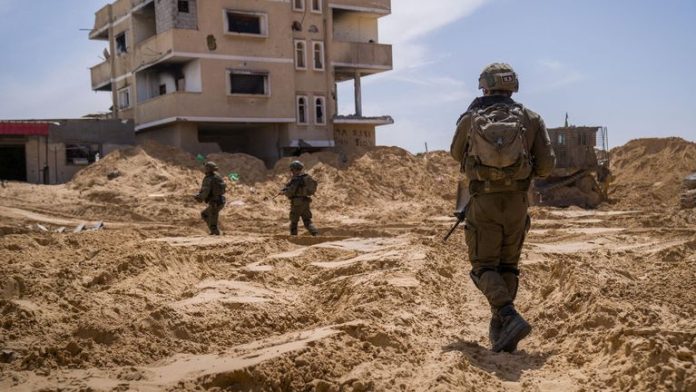The Israel Defence Forces (IDF) are in no hurry to launch a major offensive in the Gaza Strip yet to avoid damaging hostage and truce talks, but are continuing to increase pressure on Hamas to tempt the group into a deal, the Israeli military said on Thursday.
Israeli troops to remain in Gaza buffer zone, defence minister says
A major offensive undertaken for the sake of defeating the group in battle could lead to a complete collapse of the negotiations, the military said.
At the same time, the IDF does not have a deadline by which to launch an offensive in the Gaza Strip, the date of such an operation will be determined by the country’s political leadership. The military continues to prepare for a potential massive offensive against Hamas.
The IDF said its plans are not affected by letters from reservists and veterans calling for the release of hostages, even at the expense of ending hostilities.
Military control over “captured” lands
Israel intends to maintain military control over captured territories in the Gaza Strip, Lebanon and Syria, the country’s foreign minister said on Wednesday.
Israel Katz said the army will remain in the occupied “security zones” and serve as a buffer between “hostile militants and Israel.” This applies not only to the Gaza Strip, but also to Israeli-occupied territories in Lebanon and Syria.
Unlike in the past, the army will no longer withdraw from captured territories, Katz said. Katz also added that Israel will continue to block the delivery of humanitarian aid to the people of the Gaza Strip.
The military believes that the strikes, along with the blocking of humanitarian aid deliveries in the Gaza Strip, have led to increased pressure from disgruntled Palestinians on Hamas and protests. At the same time, there is enough food in the Gaza Strip and the population is not in danger of starvation, Israel believes.
The military also expanded buffer zones along the borders of the Gaza Strip, covering 30 per cent of the enclave. In particular, the IDF cut off Rafah from Khan Younis, and the future buffer zone in the area will include the entire city of Rafah. At the moment, troops are also establishing a buffer zone in the eastern neighbourhoods of Gaza City.
Israeli strikes kill at least 25 people in Gaza
However, despite the army’s claims, people continue to be killed in Gaza on a daily basis. The Gaza Civil Defence Agency said on Thursday that a wave of Israeli airstrikes on several displaced Palestinian camps in the territory had killed at least 25 people.
Spokesman Mahmoud Bassal said an overnight strike on several tents in the al-Mawasi neighbourhood in the southern town of Khan Younis killed 16 people.
“At least 16 people were killed, most of them women and children, while 23 others were injured in a direct hit by two Israeli rockets on several tents housing displaced families in al-Mawasi neighbourhood in Khan Younis,” Bassal said.
Two more strikes on other displaced camps killed eight people and wounded several others, Bassal said.
Seven people were killed in a strike on tents in the northern town of Beit Lahia, and another attack in the al-Mawasi neighbourhood killed a father and his child who were living in a tent, Bassal also added.
